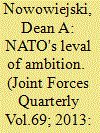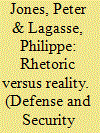| Srl | Item |
| 1 |
ID:
136074


|
|
|
|
|
| Summary/Abstract |
“Smart Defense” is NATO's new approach to risk- and burden-sharing, which has been a chronic problem within the alliance since the 1950s. Numerous solutions have been proposed, but initiatives resulting in more equitable burden-sharing have never been fully implemented. There are two driving forces influencing a county's willingness to support such initiatives – the economic theory of alliances and the risks posed by the implementation of capability sharing. The authors examine each of these and propose that rather than aiming for group consensus on the production of capabilities, NATO should focus on interoperability through support functions. This approach provides the most likely solution for connecting the forces, doctrine, procedures, standards and other factors of joint capability production such that country leaders find the risks of doing so to be politically and militarily acceptable.
|
|
|
|
|
|
|
|
|
|
|
|
|
|
|
|
| 2 |
ID:
128794


|
|
|
| 3 |
ID:
113112


|
|
|
|
|
| Publication |
2012.
|
| Summary/Abstract |
As Canada's military mission in Afghanistan winds down and the country faces several years of fiscal austerity, all of Canada's major political parties are agreed that Canadian defence budgets must stay level or be cut. This comes at a time when the defence department is slated to replace the Canadian Forces' (CF) major equipment fleets. Canada's defence establishment thus faces some critical decisions. One option is to try to maintain its expeditionary capabilities across all three services: army, navy and air force. Absent substantial new infusions of funds, however, this approach is likely to lead to an overall and largely chaotic reduction of capabilities. Another option is to make some difficult choices as to which expeditionary capabilities to maintain as part of a strategic review of Canada's future military needs. Such an option would ensure that Canada has at least some military capacities which can reliably be devoted to the most demanding international operations, while maintaining those capabilities required for domestic duties and North American defence. Pursuing this option would accord with the new North Atlantic Treaty Organization Strategic Concept and the call for "Smart Defense" within the Alliance. This article assesses the arguments for and against the option of specialising Canada's future defence capabilities and explores scenarios as to what a future CF may look like.
|
|
|
|
|
|
|
|
|
|
|
|
|
|
|
|